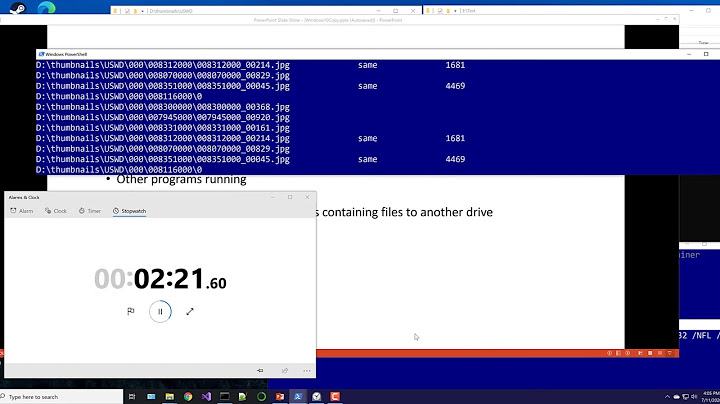How to Copy Files Fast
Solution 1
The fastest version w/o overoptimizing the code I've got with the following code:
class CTError(Exception):
def __init__(self, errors):
self.errors = errors
try:
O_BINARY = os.O_BINARY
except:
O_BINARY = 0
READ_FLAGS = os.O_RDONLY | O_BINARY
WRITE_FLAGS = os.O_WRONLY | os.O_CREAT | os.O_TRUNC | O_BINARY
BUFFER_SIZE = 128*1024
def copyfile(src, dst):
try:
fin = os.open(src, READ_FLAGS)
stat = os.fstat(fin)
fout = os.open(dst, WRITE_FLAGS, stat.st_mode)
for x in iter(lambda: os.read(fin, BUFFER_SIZE), ""):
os.write(fout, x)
finally:
try: os.close(fin)
except: pass
try: os.close(fout)
except: pass
def copytree(src, dst, symlinks=False, ignore=[]):
names = os.listdir(src)
if not os.path.exists(dst):
os.makedirs(dst)
errors = []
for name in names:
if name in ignore:
continue
srcname = os.path.join(src, name)
dstname = os.path.join(dst, name)
try:
if symlinks and os.path.islink(srcname):
linkto = os.readlink(srcname)
os.symlink(linkto, dstname)
elif os.path.isdir(srcname):
copytree(srcname, dstname, symlinks, ignore)
else:
copyfile(srcname, dstname)
# XXX What about devices, sockets etc.?
except (IOError, os.error), why:
errors.append((srcname, dstname, str(why)))
except CTError, err:
errors.extend(err.errors)
if errors:
raise CTError(errors)
This code runs a little bit slower than native linux "cp -rf".
Comparing to shutil the gain for the local storage to tmfps is around 2x-3x and around than 6x for NFS to local storage.
After profiling I've noticed that shutil.copy does lots of fstat syscals which are pretty heavyweight. If one want to optimize further I would suggest to do a single fstat for src and reuse the values. Honestly I didn't go further as I got almost the same figures as native linux copy tool and optimizing for several hundrends of milliseconds wasn't my goal.
Solution 2
You could simply just use the OS you are doing the copy on, for Windows:
from subprocess import call
call(["xcopy", "c:\\file.txt", "n:\\folder\\", "/K/O/X"])
/K - Copies attributes. Typically, Xcopy resets read-only attributes
/O - Copies file ownership and ACL information.
/X - Copies file audit settings (implies /O).
Solution 3
import sys
import subprocess
def copyWithSubprocess(cmd):
proc = subprocess.Popen(cmd, stdout=subprocess.PIPE, stderr=subprocess.PIPE)
cmd=None
if sys.platform.startswith("darwin"): cmd=['cp', source, dest]
elif sys.platform.startswith("win"): cmd=['xcopy', source, dest, '/K/O/X']
if cmd: copyWithSubprocess(cmd)
Related videos on Youtube
alphanumeric
Updated on February 28, 2021Comments
-
alphanumeric over 3 years
It takes at least 3 times longer to copy files with
shutil.copyfile()versus to a regular right-click-copy > right-click-paste using Windows File Explorer or Mac's Finder. Is there any faster alternative toshutil.copyfile()in Python? What could be done to speed up a file copying process? (The files destination is on the network drive... if it makes any difference...).EDITED LATER:
Here is what I have ended up with:
def copyWithSubprocess(cmd): proc = subprocess.Popen(cmd, stdout=subprocess.PIPE, stderr=subprocess.PIPE) win=mac=False if sys.platform.startswith("darwin"):mac=True elif sys.platform.startswith("win"):win=True cmd=None if mac: cmd=['cp', source, dest] elif win: cmd=['xcopy', source, dest, '/K/O/X'] if cmd: copyWithSubprocess(cmd)-
Ecno92 over 10 yearsYou can use the native command line options like
cpfor Linux & Mac andCOPYfor Windows. They should be as fast as when you use the GUI. -
 David Heffernan over 10 yearsOn Windows SHFileOperation gives you the native shell file copy
David Heffernan over 10 yearsOn Windows SHFileOperation gives you the native shell file copy -
moooeeeep over 10 yearsDepending on some factors not stated in the question it could be beneficial to pack the files into a compressed archive before transmission... Have you considered using something like rsync?
-
 Michael Burns over 10 yearsIf you are concerned with ownership and ACL don't use shutil for that reason alone: 'On Windows, file owners, ACLs and alternate data streams are not copied. '
Michael Burns over 10 yearsIf you are concerned with ownership and ACL don't use shutil for that reason alone: 'On Windows, file owners, ACLs and alternate data streams are not copied. ' -
alphanumeric over 10 yearsIf I use the native operation system's commands (such as OSX cp) should I be then using subprocess? Is there any Python module to call cp directly without a need for a subprocess on Mac?
-
 Morwenn almost 6 yearsIt's worth noting that in Python 3.8 functions that copy files and directories have been optimized to work faster on several major OS.
Morwenn almost 6 yearsIt's worth noting that in Python 3.8 functions that copy files and directories have been optimized to work faster on several major OS.
-
-
Sharif Mamun over 10 yearsI believe you would be a good instructor, nice!
-
alphanumeric over 10 yearsGood point. I should be more specific. Instead of right-click-copy and then paste: This schema: 1. Select files; 2. Drag files. 3 Drop files onto a destination folder.
-
Joran Beasley over 10 yearsthats a move then ... which is much different ... try
shutil.moveinstead -
alphanumeric over 10 yearsWould "xcopy" on Windows work with a "regular" subprocess, such as: cmd = ['xcopy', source, dest, "/K/O/X"] subprocess.Popen(cmd, stdout=subprocess.PIPE, stderr=subprocess.PIPE)
-
 Michael Burns over 10 yearsThat will work as well.
Michael Burns over 10 yearsThat will work as well. -
alphanumeric over 10 yearsGreat! Thanks for the help!
-
alphanumeric over 10 yearsIn win it could be a move. In osx it could be a copy.
-
 searchengine27 over 7 yearsThis solution does not scale. As the files get large this becomes a less usable solution. You would need to make multiple system calls to the OS to still read portions of the file into memory as files get large.
searchengine27 over 7 yearsThis solution does not scale. As the files get large this becomes a less usable solution. You would need to make multiple system calls to the OS to still read portions of the file into memory as files get large. -
Joran Beasley over 7 yearsthis was a question about timings ... and it was basically pointing out his operations were not equivelent
-
muppetjones over 7 yearsNot sure if this is specific to later versions of python (3.5+), but the sentinel in
iterneeds to beb''in order to stop. (At least on OSX) -
Robert Kelly about 7 yearsI find it hard to believe that if you CTRL + C a 100 gigabyte file in Windows it attempts to load that in memory right then and there...
-
Joran Beasley about 7 yearstheres more than a grain of truth to that im sure ... perhaps i oversimplified it
-
 Admin almost 7 yearsInvalid number of parameters error
Admin almost 7 yearsInvalid number of parameters error -
 Vasily over 6 yearsdoesn't work with python 3.6 even after fixing 'except' syntax
Vasily over 6 yearsdoesn't work with python 3.6 even after fixing 'except' syntax -
Dmytro over 6 yearsThis is a python2 version. I haven't tested this with python3. Probably python3 native filetree copy is fast enough, one shall do a benchmark.
-
 Soumyajit over 6 yearsThis is way faster than anything else I tried.
Soumyajit over 6 yearsThis is way faster than anything else I tried. -
Spencer almost 6 yearsFYI I would suggest adding
shutil.copystat(src, dst)after the file is written out to bring over metadata. -
Spencer over 5 years@Dmytro Just tested in py3.6, still 3x faster than shutil.copy2()!
-
Varlor over 5 years@Spencer What did you changed in the code to make it work with python 3.5+ ?, Best regards!
-
Spencer over 5 years@Varlor From what I remember I just changed this one line to the following:
for x in iter(lambda: os.read(fin, BUFFER_SIZE), b""):(made the string into bytes by adding 'b') -
Varlor over 5 yearsah, because I get also a syntax error with the 'why' in the except line 'except (IOError, os.error), why:'
-
Vahid Pazirandeh over 5 yearsTo boost performance also see the pyfastcopy module which uses the system call sendfile(). This module works for Python 2 and 3. All you have to do is literally "import pyfastcopy" and shutils will automatically perform better. Like @Morwenn mentioned above, Python 3.8 will have sendfile() built into its impl.
-
Andry over 4 yearsI've tried to replace
shutil.copyfileby thecopyfilefrom the example under python3.8.0, but it seems hanged in thefor x in iterloop. -
Andry over 4 years@VahidPazirandeh
pyfastcopydoes not work on Windows: Thesendfilesystem call does not exist on Windows, so importing this module will have no effect. -
 Gustavo Gonçalves about 4 yearsEconomic on explanations, but this is a great answer.
Gustavo Gonçalves about 4 yearsEconomic on explanations, but this is a great answer. -
 Rexovas over 3 yearsNote that the /O and /X flags require an elevated subprocess, else you will result in "Access denied"
Rexovas over 3 yearsNote that the /O and /X flags require an elevated subprocess, else you will result in "Access denied" -
Spencer about 2 yearsFor those trying to get the best performance, buffer size is VERY important zabkat.com/blog/buffered-disk-access.htm
-
Spencer about 2 yearsThis is a very fast option for single-file copies, but for anyone out there trying to thread large numbers of files it can run far slower (9x in a recent test of 4000 files). I was able to get better results modifying copy2 buffer size as in other answer.






